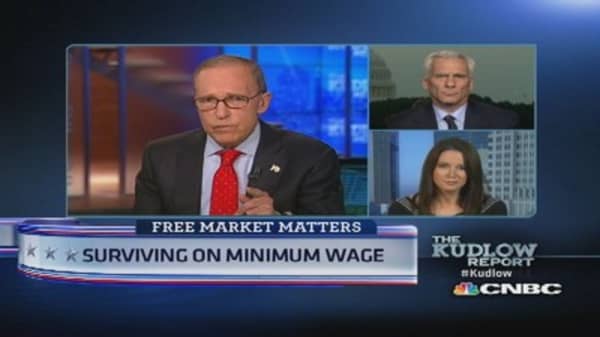(Read more: Job hunting gifts for graduates)
Most of his friends in the business school became accounting majors because it was considered a safer, more stable career. But, he stuck with finance even though the field was losing its sky-high salaries and prestige.
The risk he took appears to be paying off.
Managers in financial services are a bit more likely to hire new college graduates, according a CareerBuilder survey released earlier this year. Some 63 percent of them planned to hire the new group compared to 59-percent in 2012. The overall average for all industries is 65 percent.
But the industry is still trying to fight off that credit crisis-induced stigma.
In a post-crisis world, new college graduates are making compromises just to get their foot into the door. Even though the jobs market has made some improvements, many are accepting lower pay and less desired positions.
Libson said his older colleagues often reminisce about the "glory days" of big bonus checks while battling nerves about the risk of new rounds of layoffs.
(Read more: Highest-paying bachelor's degrees of 2013)
He isn't immune from the jitters. He's living with his parents in Westchester, New York, and is more conservative with his money than he wants to be.
Libson's situation is not anecdotal—it may be more common than you think.
Stanford University Professor Edward Lazear points out studies showing the tendency for young people to move back with their parents in the years following a big economic hit.
Lazear, who was chairman of President's Council of Economic Advisers from 2006 to 2009, is considered one of the nation's leading labor economists.
He said many studies find that when a generation completes college during high unemployment, it has a permanent effect on their wealth for a lifetime. It's not enormous but it's there, according to Lazear.
(Read more: The coolest jobs of 2013)
"Their fears (of layoffs and low salaries) are justified. But if you look at the difference between college graduates and those who aren't, there is still an enormous difference in the unemployment rate," said Lazear. "You still get a job. But it is true wages haven't gone up very much over the past few years."
It's a predicament affecting 21-year-old Chelsea Weiner.
After a three- to four-month job search that didn't live up to her expectations, she accepted a job at FSO, her father's human resources company.
"I had this saying, 'I am not the type of person who comes out of college and says I'm working for daddy.' I used that quote all the time (in college). I wanted to be successful on my own," said Weiner, a guidance counseling and administration major who graduated from Roger Williams University in May.
Weiner said she received three or four job offers after graduation, but the salaries were low and she would have had difficulty making ends meet.
She now shares a converted two bedroom apartment in Manhattan with a childhood friend. Her parents have been helping her financially, but that's winding down. Weiner said it's very important for her to be independent.
(Read more: Parents face the student loan double whammy)
"I pay 90 percent of my expenses by myself right now," said Weiner, who's still considering graduate school.
A major question is whether taking career detours or signing up for more education will pay off for the new generation of professionals adapting to a less than ideal jobs market.
CareerBuilder.com spokesman Jennifer Grasz noted that returning to the classroom could only help, by increasing market appeal to a broader range of employers.
"At this stage of the game, it's all about stepping stones and gaining relevant experience," said Grasz. "If it's a less-than-ideal position, but the company provides good learning or career advancement opportunities, then it may be worth your while."
—By CNBC's Stephanie Landsman. Follow her on Twitter at @StephLandsman.





